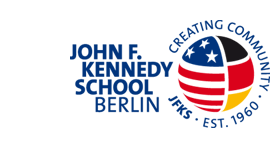Originally founded as the German-American Community School in 1960, the school was named after U.S. President John F. Kennedy following his assassination in 1963. Predicated on the value of a combined German-English language education, JFKS emphasizes the development of cross-cultural tolerance, understanding, and respect. Although the JFKS is a public school, which is established in accordance to German law, it was set up under its own by-laws, which are geared toward the German-American nature of its program.
The second decade of the JFKS was essentially one of implementation and consolidation of the decisions and curricula developed for the school in the course of the 1960’s.
Since 1972, JFKS has offered the standard German college preparatory certificate, the Abitur, along with offering students the opportunity to complete the requirements for a US high school diploma.
In the 1980’s, the JFKS engaged in a re-examination of its goals and effectiveness in the wake of educational reforms that had been adopted in Germany and the United States in the previous decade. Three areas received particular attention and improvement: the middle grades, language instruction, and extracurricular activities.
In the mid-’80’s the school embarked on an intensive series of discussions concerning teaching methodology and launched a new program of construction and renovation to enable the implementation of improvements identified in these deliberations. In addition, during this time the high school received its first accreditation from the New England Association of Schools and Colleges.
The collapse of the former German Democratic Republic (East Germany) in 1989 and the reunification of Germany in 1990 presented new challenges to the JFKS. Reunification and the subsequent withdrawal of Soviet forces from eastern Germany resulted in a corresponding withdrawal of Allied forces in Berlin. This altered political and military landscape required significant adjustments for the JFKS because the children of US military personnel accounted for approximately 25 percent of the school’s total enrollment.
In 1993-94 the JFKS administration decided to expand the school’s English-language dimension by opening attendance to qualified applicants from other English speaking countries. The school saw a major impact after Berlin was reinstated as Germany’s capital and the subsequent influx of embassy families in the community. For example, the number of students attending JFKS rose from approximately 1,200 in 1999 to 1,650 in 2001 until now.
This post is also available in: Deutsch



